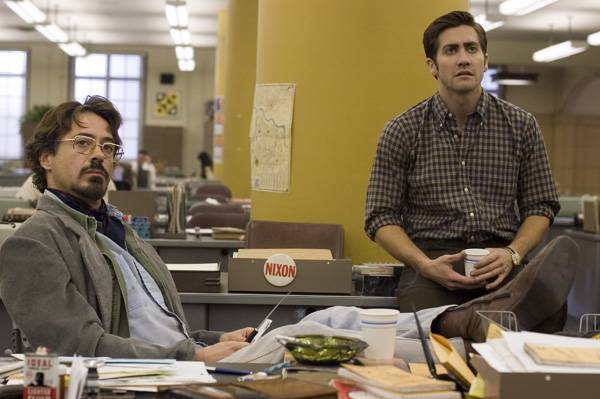David Fincher: ZODIAC
ZODIAC
Written by James Vanderbilt
Directed by David Fincher
Who doesn’t like to play games? You face the other players dead on and you struggle to retain control over the board, keeping everyone else guessing as to what your next move will be. In the 1960’s and 70’s, one such game player, who called himself the Zodiac, decided all by himself that he would start his own game. He would decide who the players would be and he would make up all the rules. The stakes in his game though were a slight bit higher than your average game of Risk. Drawing his inspiration from a 1932 film entitled “The Most Dangerous Game”, where a man hunts other humans because he feels them to be the most dangerous animal of all, the Zodiac began a series of senseless killings that terrorized the people of San Francisco. And this was just the start for this game. The Zodiac sent letters to several prominent San Francisco media outlets, demanding that they print his confessions and their accompanying ciphers on their front page. Fearing that the Zodiac would make good on the threats his letters contained if they didn’t, the messages ran and the public went into a state of mass paranoia and fear. As the killings and messages went on for years, the Zodiac baffled the police and the public with a mystery that remains inconclusively unsolved.
Another man who clearly enjoys his game play is director David Fincher. In SE7EN, he toyed with our morals; in FIGHT CLUB, he split personalities and teased our collective subconscious; and in PANIC ROOM, he locked us in a tiny space and made us feel like we couldn’t breathe. He even made a movie entitled THE GAME at one point. For his first film in five years, Fincher plays with our basic need to understand and to make sense of something. ZODIAC bounces back and forth between an exhausting police investigation that spreads across numerous jurisdictions, the frightening killings themselves and the life of a cartoonist who develops a fascination with the Zodiac that eventually becomes a crippling obsession. Jake Gyllenhaal plays Robert Graysmith, the real life man who went from drawing satirical cartoons for the San Francisco Chronicle to writing the definitive book on the Zodiac killings. Graysmith is a natural when it comes to solving puzzles so when he is exposed through his position at the SF Chronicle to private information regarding the killings, he needs to piece this one together too. It is the mother of all puzzles and there is no way he can let it go unsolved.
Subsequently, we too need to figure this whole mess out. Fincher makes it so Graysmith’s obsession becomes ours as well by allowing us to have only certain pieces of the puzzle at certain times. The sheer vastness of how far the Zodiac’s murders were spread out meant that many clues went undeveloped because they needed others to be brought to light. Fittingly, ZODIAC is one of the darkest films I’ve seen. Yes, I meant that to suggest that it is twisted and sick like any serial killer film should be but I was referring more to Harris Savides’s stark use of lighting throughout. Light tends more to showcase than fill which keeps the viewer just as in the dark as the police and the San Francisco public. Even the humour is dark. James Vanderbilt’s script is dizzying as it travels back and forth between the vast number of lives affected by the Zodiac but he still manages to find laughs amidst a mass murder investigation. The laughs may feel awkward but ZODIAC is meant to be uncomfortable and, like any harrowing and consuming experience, it would be impossible to make it through it if we didn’t laugh every once in a while.
Captions constantly remind the viewer that time is passing by at a rapid rate yet at no point does the film feel long. While the passage of time reflects the reality of the events that took place, it also ensures the viewer knows how frustrating the entire investigation was. All involved went years without coming to any substantiated conclusions. With the central focus of their lives not making any sense, it became impossible to connect with the rest of their surroundings. ZODIAC is an intensely involving mystery that is both chilling and infuriating in all the right ways. It is itself its own puzzle remaining to be solved. Without understanding, there is no security or certainty. Just like a game of checkers or going out on a first date, success depends on figuring out the other player as much as it involves understanding yourself. The same applies to the investigation of the Zodiac killings. You will need to know how and why it happened but you will not really want to, considering to fully understand this mystery means staring into the eyes of a murderer who kills for sport. Good game, Mr. Fincher.
I have no idea what I'm doing but incompetence has never prevented me from plunging in with enthusiasm.
- Woody Allen




 Reply With Quote
Reply With Quote

Bookmarks